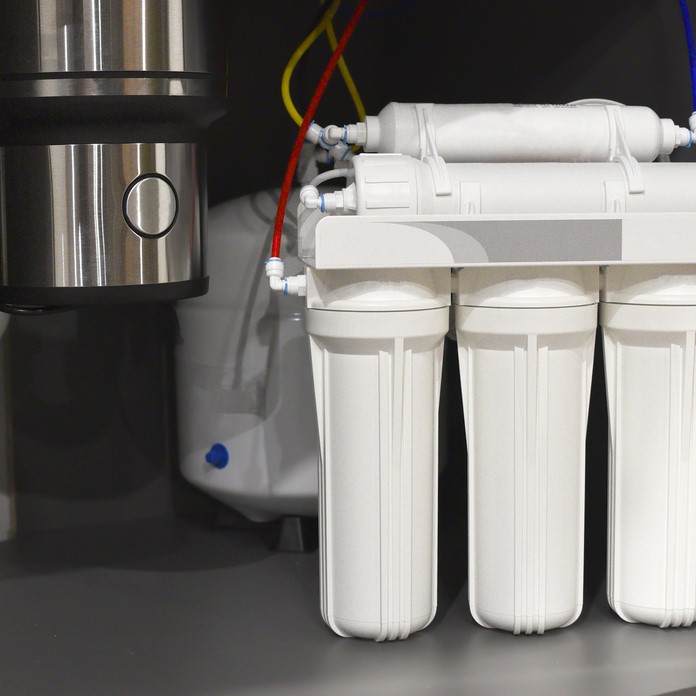A Comprehensive Guide on Reverse Osmosis
Want to ditch water bottles and invest in a sustainable water purification solution? A reverse osmosis (RO) filter may be precisely what you are looking for. RO filters have quickly become one of the most popular water purification systems in the United States. An RO filtration system can remove more contaminants than its competitors. We’ve put together this comprehensive guide on reverse osmosis to help you determine if it is the right solution for you.
 How Does Reverse Osmosis Work?
How Does Reverse Osmosis Work?
The RO filter is made of a very fine, semi-permeable membrane. Water pressure pushes water through the membrane, capturing contaminants in the process. Purified water passes through the membrane while pollutants stay on the other side and are flushed out of the system.
How Does an RO Filter Compare to Other Filters?
There are six primary types of filters used in the US: carbon filters, RO filters, ceramic filters, distillation, ultraviolet (UV) ray systems, and Ozone systems. Each one has strengths and disadvantages:
Carbon Filters can effectively remove hard metals (like lead and mercury), carcinogenic volatile organic compounds (VOCs), and asbestos. These filters cannot remove many inorganic contaminants such as fluoride, arsenic, and chemicals from pesticides and herbicides like chromium, nitrate, and perchlorate.
Ultraviolet Light Filters & Ozone Systems remove microorganisms like viruses, bacteria, and parasites. Unfortunately, these filters can’t get rid of other types of contaminants.
Ceramic Filters or Sediment Filters remove gritty particles like dust, dirt, sand, and rust. However, these filters cannot remove dangerous chemical pollutants or other microscopic, organic contaminants.
Distillation is a process that removes mineral and chemical contaminants along with microorganisms like viruses and bacteria. It is unable to remove VOCs, chlorine, or trihalomethanes.
Reverse Osmosis Filters can remove heavy metals, chemicals, microbial contaminants, and pesticides. Reverse osmosis filtration systems also typically include an activated carbon filter to pick up chlorine, trihalomethanes, and VOCs.
How Much Maintenance Does an RO system require?
The amount of maintenance that your RO system requires will depend on how many stages it has. RO systems have anywhere from 3 to 10 stages. Most people choose an RO system with 4 stages: a sediment filter, RO membrane, carbon filter, and calcite filter.
Sediment filter—This is usually the first stage in an RO system. It removes particulate contaminants like dust, gravel, and salt to prolong the life of the RO membrane. You will typically need to change this filter every 6 months.
RO Membrane —The semi-permeable membrane filter does most of the work removing harmful contaminants. It lasts much longer than the sediment filter. You only need to change it every 2 to 5 years.
Carbon filter—The carbon filter removes additional impurities and improves the taste and color of your water. Like the sediment filter, it should be changed about every 6 months.
Calcite Filter—In most RO systems, this is the final stage. The calcite filter adds minerals back into your water and infuses it with electrolytes to improve its taste and quality. Like the RO membrane, it only needs to be changed every two to five years.
An RO filtration system can typically last for ten to fifteen years. To ensure that it has a long life span, it’s wise to have it deep cleaned by a professional at least once a year. You may be able to have it serviced by the same professionals who installed it for you.
 What is the best RO system?
What is the best RO system?
The best RO system for your home or workplace depends on the quality of your water. We recommend having your water tested to determine if an RO system is the best fit to address your water quality issues. When you are shopping for a RO filtration system, look for NSF-certified models. Formerly known as the National Sanitation Foundation, the NSF is an independent organization that develops standards and rigorously tests water purification systems. Be sure to look closely at the NSF seal. It will include valuable information such as how long the filters will last. If you would like to learn more about RO filters or set up a FREE in-home water analysis, give Tri-Florida Water Treatment a call! We serve residents throughout the Lakeland, Florida, area who want clear, great-tasting water.
